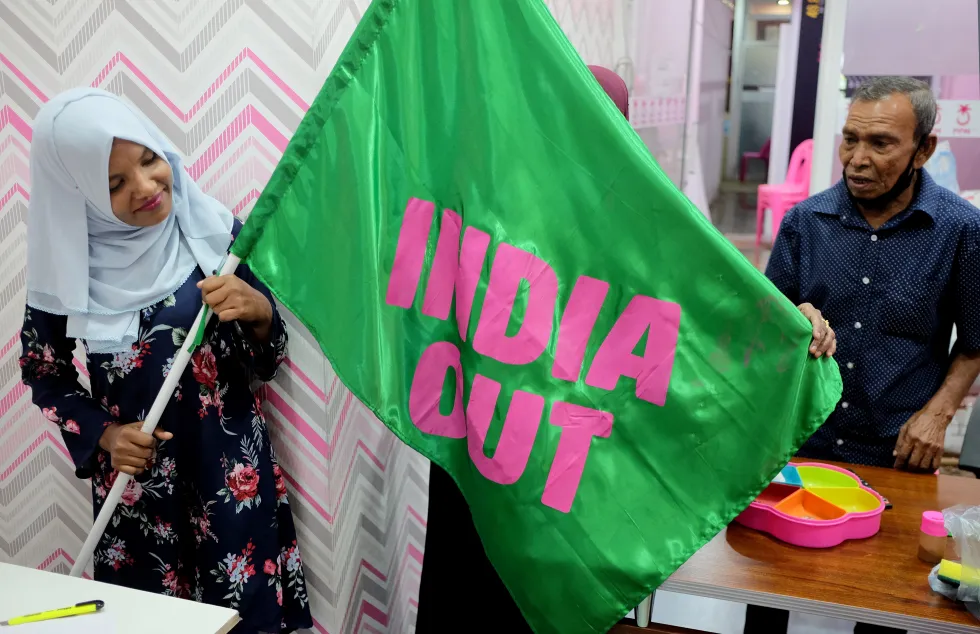By: Ilma Hasan , Ishaana Aiyanna
January 11 2024
 A Progressive Party of Maldives worker poses with an "India Out" flag in Male, Maldives, March 21, 2022. Picture taken March 21, 2022. REUTERS/Alasdair Pal
A Progressive Party of Maldives worker poses with an "India Out" flag in Male, Maldives, March 21, 2022. Picture taken March 21, 2022. REUTERS/Alasdair Pal
The now-ruling coalition government in the Maldives, consisting of the Progressive Party of Maldives (PPM) and the People’s National Congress (PNC), employed disinformation tactics targeting India during the campaigning leading up to the September presidential elections last year, a report by European Union’s Election Observation Mission (EU EOM) found.
"Their campaign included anti-Indian sentiments, based on fears of Indian influences and anxiety regarding a presence of Indian military personnel inside the country (sic)," the report stated. "This theme was subject to multiple online disinformation attempts."
Both the PPM-PNC coalition and the ousted Maldivian Democratic Party (MDP) engaged in what the report termed as "negative campaigning," with the coalition parties consistently targeting the MDP for allowing the presence of the Indian military on Maldivian soil.
It also pointed out that Facebook and X (formerly Twitter) played a significant role in disseminating such information, with misleading narratives "potentially influencing public opinion and shaping the election discourse."
"Disinformation, amplified by online media, potentially swayed public opinion and, amid heightened political activity, presented the potential to influence the election process," the EOM report added.
This revelation comes when India and the Maldives are entangled in a diplomatic dispute triggered by disparaging comments from Maldivian ministers directed at Indian Prime Minister Narendra Modi.
PM Modi had visited and posted pictures from the Indian archipelago of Lakshadweep, in a bid to promote tourism. Some ministers within the Maldivian government perceived this move as an attempt to steer visitors away from their country – whose economy is heavily dependent on tourism.
The comments led to massive backlash online. The three Maldivian ministers were subsequently suspended, and India’s foreign affairs minister summoned the Maldivian envoy over the insults.
But despite the government distancing itself from the comments, Maldivian President Mohamed Muizzu, known for his closer relations with China, appealed to Beijing to boost tourism to the island nation.
Muizzu’s party had led an "India Out" campaign since 2020, which was banned in April 2022 by a presidential decree criminalizing such demonstrations. During the elections last year, Muizzu campaigned on promises of higher sovereignty, advocating for the removal of all foreign military personnel – as India maintains approximately 70 military personnel operating surveillance aircraft and patrolling the region.
A quick look at the hashtag #IndiaOut from 2022, and between January to April 2023, shows several tweets from current cabinet ministers.

Maryam Lhufa Khaleel, a deputy minister in the Maldivian government, had used the hashtag #IndiaOut in a post. Limited reach- 26 reposts and about 43 likes. (Source: X/Screenshot)

Criticism of former president Ibu Solih’s pro-India stance, by Abdul Raheem Abdullah, the current advisor to the President of the Maldives. The post has about 6,469 views and 63 retweets and 81 likes. (Source: X/Screenshot)

A post written by Ahmed Azaan, founder of Maldives’ news portal Dhiyares. This post received about 4,549 views, 39 reposts, and 44 likes (Source: X/screenshot)
Presently, President Muizzu is on a five-day state visit to China, where the two countries signed 20 agreements on January 10. Last month, Muizzu and Modi discussed Maldives' request to withdraw Indian military personnel and strengthen ties during their meeting on the sidelines of COP28.
The EU had deployed a mission to observe the September 9, 2023, presidential election in Maldives in response to an invitation from the country’s authorities. The EOM’s mandate was to assess the election in line with the domestic legal framework and the international and regional standards and commitments the Maldives made regarding democratic elections.